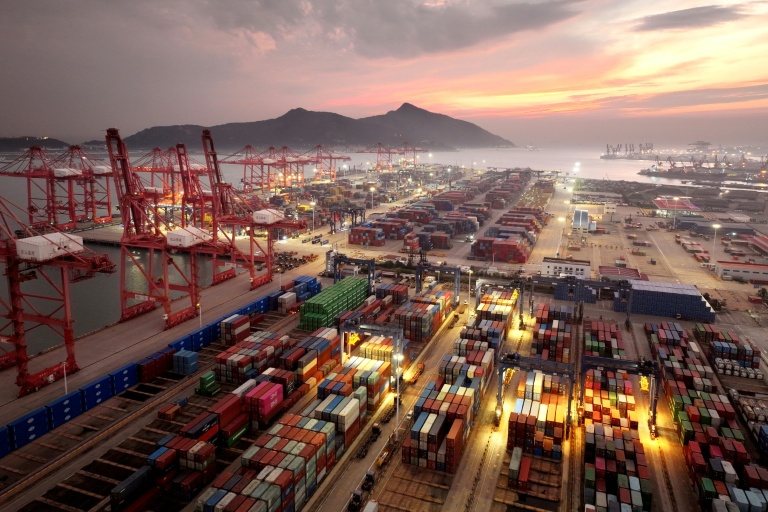World
IMF and World Bank Meetings Begin Amid US-China Trade Tensions

The semi-annual meetings of the International Monetary Fund (IMF) and the World Bank commence in Washington, D.C., on Monday, coinciding with escalating trade tensions between the United States and China. These discussions come on the heels of China’s recent announcement of new export restrictions on critical minerals, which prompted a strong reaction from U.S. President Donald Trump. He declared plans to impose new tariffs of up to 100 percent on Chinese imports, stirring concerns of a renewed trade conflict.
This news broke just after U.S. stock markets closed on Friday, leading to a sharp decline in shares as investors reacted to the potential ramifications of heightened trade hostilities. Speaking at an event in Washington last week, IMF Managing Director Kristalina Georgieva noted that while the global economy is performing “better than feared, but worse than we need,” the IMF anticipates only a slight slowdown in global growth this year and next. This outlook is supported by unexpectedly strong conditions in the United States and some advanced economies, as well as emerging markets.
Focus on Economic Stability and Job Creation
The discussions will take place at the IMF and World Bank headquarters, located near the White House. For the World Bank, the emphasis will likely center on job creation. President Ajay Banga is scheduled to participate in several events aimed at enhancing labor market participation, particularly in nations experiencing significant population growth.
The IMF will also conduct press conferences regarding its key reports that assess the global economy’s health, fiscal policy, and financial stability. One significant event during the meetings will be a roundtable focused on Ukraine, which continues to face daily drone and missile attacks more than three years after Russia’s full-scale invasion. The IMF plans to discuss ongoing support for Ukraine and the necessary efforts for its reconstruction.
Meetings will also convene among finance ministers from the G7 group of advanced economies, alongside a gathering of the G20 nations, which includes both the United States and China.
Trade Tensions and Economic Implications
Prior to the latest trade dispute, tariffs imposed under Trump’s administration had already elevated U.S. import taxes to their highest levels in decades. This situation has contributed to a cooling of economic growth and rising prices. Despite these challenges, Kristalina Georgieva expressed optimism, stating that “all signs point to a world economy that has generally withstood acute strains from multiple shocks.” She emphasized that the world has so far avoided a full-scale trade war.
The White House maintains that, in the long run, the impact of tariffs will be beneficial for the U.S. economy, citing their relatively limited effects to date. As these vital meetings unfold, the global economic landscape remains under scrutiny, with the potential for significant implications stemming from the ongoing U.S.-China trade dynamics.
With representatives from 100 different nationalities, these meetings aim to tackle pressing issues that affect millions globally, reaffirming the importance of cooperation in a time of uncertainty.
-

 Science3 months ago
Science3 months agoToyoake City Proposes Daily Two-Hour Smartphone Use Limit
-

 Health4 months ago
Health4 months agoB.C. Review Reveals Urgent Need for Rare-Disease Drug Reforms
-

 Top Stories4 months ago
Top Stories4 months agoPedestrian Fatally Injured in Esquimalt Collision on August 14
-

 Technology3 months ago
Technology3 months agoDark Adventure Game “Bye Sweet Carole” Set for October Release
-

 World3 months ago
World3 months agoJimmy Lai’s Defense Challenges Charges Under National Security Law
-

 Lifestyle4 months ago
Lifestyle4 months agoVictoria’s Pop-Up Shop Shines Light on B.C.’s Wolf Cull
-

 Technology3 months ago
Technology3 months agoKonami Revives Iconic Metal Gear Solid Delta Ahead of Release
-

 Technology3 months ago
Technology3 months agoApple Expands Self-Service Repair Program to Canada
-

 Technology3 months ago
Technology3 months agoSnapmaker U1 Color 3D Printer Redefines Speed and Sustainability
-

 Technology3 months ago
Technology3 months agoAION Folding Knife: Redefining EDC Design with Premium Materials
-

 Technology4 months ago
Technology4 months agoSolve Today’s Wordle Challenge: Hints and Answer for August 19
-

 Business4 months ago
Business4 months agoGordon Murray Automotive Unveils S1 LM and Le Mans GTR at Monterey









